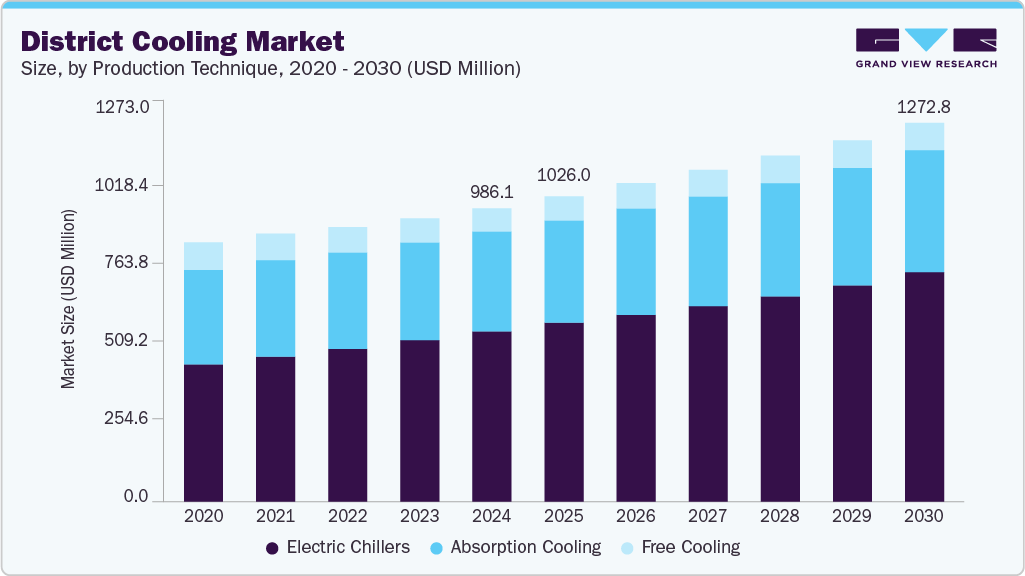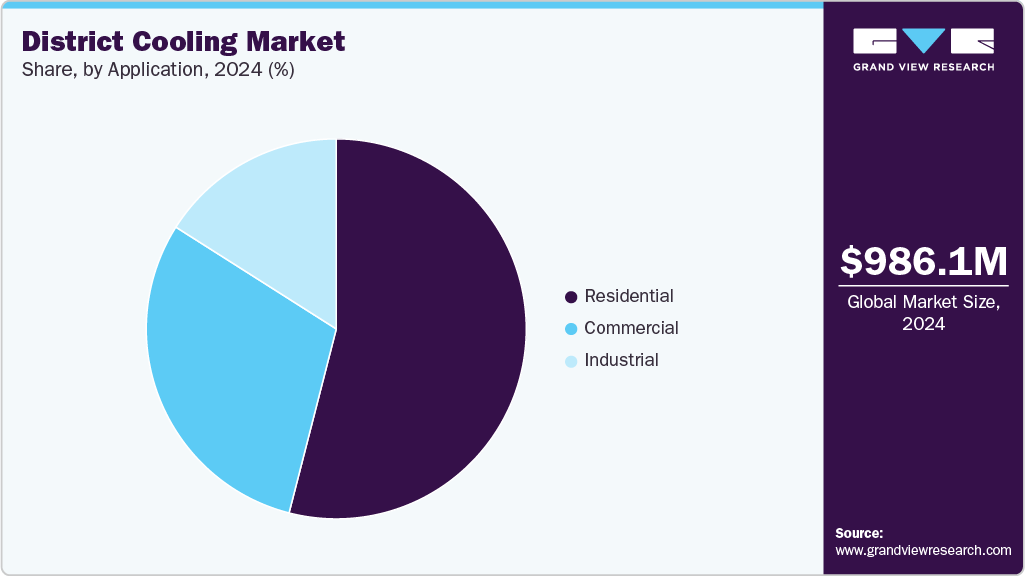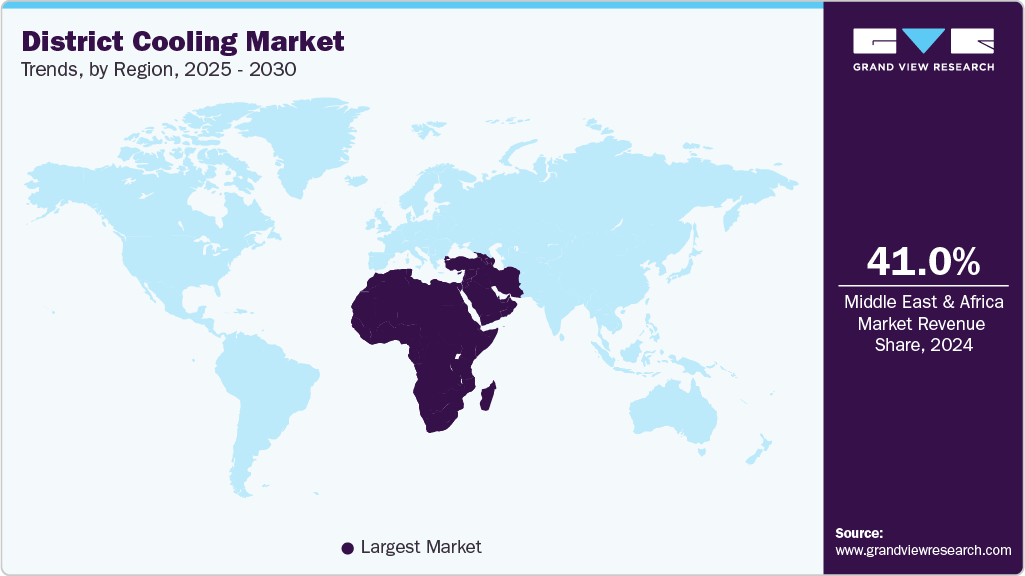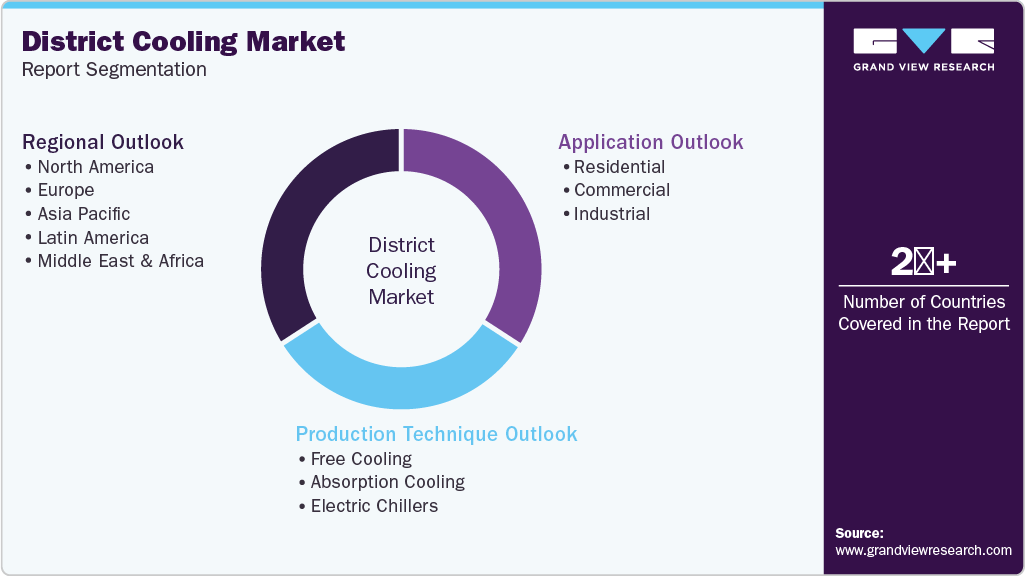- Home
- »
- Advanced Interior Materials
- »
-
District Cooling Market Size & Share, Industry Report, 2030GVR Report cover
![District Cooling Market Size, Share & Trends Report]()
District Cooling Market (2025 - 2030) Size, Share & Trends Analysis Report By Production Technique (Free Cooling, Absorption Cooling, Electric Chillers), By Application (Residential, Commercial, Industrial), By Region, And Segment Forecasts
- Report ID: GVR-4-68040-335-6
- Number of Report Pages: 120
- Format: PDF
- Historical Range: 2017 - 2023
- Forecast Period: 2025 - 2030
- Industry: Advanced Materials
- Report Summary
- Table of Contents
- Segmentation
- Methodology
- Download FREE Sample
-
Download Sample Report
District Cooling Market Summary
The global district cooling market size was estimated at USD 986.1 million in 2024, and is projected to reach USD 1,272.8 million by 2030, growing at a CAGR of 4.4% from 2025 to 2030. The increasing demand for energy-efficient cooling solutions primarily drives the market growth.
Key Market Trends & Insights
- The Middle East & Africa district cooling market dominated the district cooling industry with 41.0% of the revenue share in 2024.
- UAE district cooling market dominated the Middle East & Africa district cooling industry with 35.2% of the revenue share in 2024.
- By production technique, electric chillers segment accounted for the largest revenue share of 58.1% in 2024.
- By application, commercial segmet accounted for the largest revenue share, 53.7%, in 2024.
Market Size & Forecast
- 2024 Market Size: USD 986.1 Million
- 2030 Projected Market Size: USD 1,272.8 Million
- CAGR (2025-2030): 4.4%
- Middle East & Africa: Largest market in 2024
As urbanization expands and temperatures rise due to climate change, the need for sustainable cooling systems becomes more pressing. District cooling offers significant energy savings by centralizing cooling production and distributing chilled water to multiple buildings, reducing overall electricity consumption compared to traditional air conditioning methods.The District Cooling (DC) Guidelines were developed as part of the Energy Efficient Cooling (EE Cool) initiative by GIZ GmbH on behalf of the German Federal Ministry for Economic Affairs and Climate Action (BMWK) and Bureau of Energy Efficiency (BEE), India.

Several factors drive the district cooling market, including the increasing demand for energy-efficient cooling solutions, rapid urbanization, and supportive government policies. The growing awareness about climate change and the need for sustainable urban development also contributes to market growth. Furthermore, district cooling systems offer cost advantages in reduced energy consumption and lower maintenance costs, making them an attractive option for large-scale cooling applications. However, the high initial investment and the complexity of installing and integrating district cooling systems pose significant challenges. Additionally, the need for a well-developed infrastructure for the distribution of cooling energy can limit the adoption of district cooling in certain regions.
Despite these challenges, numerous growth opportunities exist, particularly with the increasing focus on smart cities and sustainable urban development. Integrating renewable energy sources, such as solar and geothermal energy, into district cooling systems presents significant innovation and market expansion opportunities.
Production Technique Insights
Electric chillers accounted for the largest revenue share of 58.1% in 2024 due to its widespread use in commercial and industrial applications. Electric chillers are known for their high efficiency and reliability, making them popular for large-scale cooling requirements.
The absorption cooling segment is expected to grow at a CAGR of 3.5% from 2025 to 2030. The increasing focus on energy efficiency and the use of waste heat and renewable energy sources are driving the growth of the absorption cooling segment. Absorption cooling systems utilize heat energy instead of electricity to provide cooling, making them an environmentally friendly and cost-effective solution.
Application Insights
Commercial accounted for the largest revenue share, 53.7%, in 2024, owing tothe growing adoption of district cooling systems in office buildings, shopping malls, hotels, and mixed-use developments-all of which demand efficient and cost-effective cooling solutions. With rising urbanization and sustainability goals, commercial projects increasingly favor district cooling for its energy savings and operational efficiency.

The residential segment is expected to grow at the fastest CAGR of 4.0% from 2025 to 2030 due to the increasing adoption of district cooling systems in residential complexes and multi-family housing units. The rising urban population and the need for efficient cooling solutions in densely populated areas contribute to this segment's growth.
Regional Insights
The Middle East & Africa district cooling market dominated the district cooling industry with 41.0% of the revenue share in 2024. The region's hot climate, rapid urbanization, and significant investments in infrastructure development. The need for energy-efficient and sustainable cooling solutions in commercial and residential buildings drives the demand for district cooling. Governments in the region are also promoting the adoption of district cooling systems through favorable policies and incentives. In May 2024, Sojitz Corporation and FAS Energy formed a joint venture to develop district cooling services in Saudi Arabia, marking Sojitz’s entry into district cooling segment in Saudi Arabia.

UAE District Cooling Market Trends
UAE district cooling market dominated the Middle East & Africa district cooling industry with 35.2% of the revenue share in 2024. Many businesses in the UAE are implementing district cooling systems due to their cost-efficiency and long-term service. District cooling systems require 50% less energy than air conditioners, resulting in lower initial expenditure and ongoing maintenance costs. Large-scale establishments such as airports, business buildings, university campuses, and residential towers significantly benefit from district cooling systems cost savings and efficiency.
District cooling systems provide a more energy-efficient and sustainable solution for cooling buildings than individual air conditioning systems. With rising awareness of environmental protection and changing preferences towards energy-efficient refrigeration technology in the country, the demand for district cooling is increasing.
North America District Cooling Market Trends
The district cooling market in North America is expected to grow substantially over the forecast years.Increasing sustainability initiatives, rising urban development, and the push for energy-efficient infrastructure. Government policies promoting clean energy and carbon reduction are encouraging widespread adoption of district cooling systems, particularly in commercial and industrial sectors. Advancements in renewable energy integration and smart cooling technology will further drive market expansion.
The U.S. district cooling industry is expected to grow significantly over the forecast period. Decarbonization efforts and federal incentives are accelerating the adoption of centralized cooling solutions, as government policies provide tax credits and funding to promote energy efficiency.
Asia Pacific District Cooling Market Trends
The district cooling market in Asia Pacific is expected to grow at a CAGR of 5.0% over the forecast years. The region’s growth is driven by rapid urbanization, increasing investments in smart cities, and rising demand for energy-efficient cooling solutions across commercial and residential sectors. Countries such as China, India, and Singapore are actively adopting district cooling systems to enhance sustainability and reduce electricity consumption.
Key District Cooling Company Insights
Some of the key companies in the district cooling market include Veolia, Danfoss, Emicool, SHINRYO CORPORATION, ALFA LAVAL, ADC Energy Systems, and others. Organizations focus on increasing their customer base to gain a competitive edge in the industry. Therefore, key players are taking several strategic initiatives, such as mergers and acquisitions and partnerships with other major companies.
-
Emirates Central Cooling Systems Corporation PJSC is a district cooling service provider in the Middle East. It offers sustainable and energy-efficient cooling solutions for residential, commercial, and industrial applications. The company's extensive network and innovation focus have solidified its market position.
-
Veolia is a global leader in optimized resource management, including district cooling solutions. The company's focus on sustainability and innovation has made it a key player in the market, providing efficient and eco-friendly cooling services.
-
Emicool is a major district cooling service provider in the UAE. It offers energy-efficient and sustainable cooling solutions for residential and commercial buildings. The company's commitment to environmental sustainability and advanced technology integration has driven its market growth.
Key District Cooling Companies:
The following are the leading companies in the district cooling market. These companies collectively hold the largest market share and dictate industry trends.
- Veolia
- Danfoss
- Emicool
- SHINRYO CORPORATION
- ALFA LAVAL
- ADC Energy Systems
- DAIKIN INDUSTRIES, Ltd.
- Tabreed
- AtkinsRéalis
- Emirates Central Cooling Systems Corporation PJSC
- Keppel Ltd
- Qatar District Cooling Company Private J.S.C
- Stellar Energy International
- ENGIE
Recent Developments
-
In January 2025, Emicool, a leading district cooling provider, partnered with Quant Gulf to deploy the Schaeffler OPTIME Ecosystem, enhancing operational efficiency and sustainability.
-
In October 2024, Tata Power Trading Company Limited partnered to launch Cooling-as-a-Service (CaaS) solutions in India, supporting the India Cooling Action Plan (ICAP) and Smart Cities Mission.
-
In June 2023, Emirates Central Cooling Systems Corporation PJSC announced it awarded multiple contracts to build a cutting-edge district cooling plant and expand the cooling network in Jumeirah, Dubai. The new plant, with a capacity of 48,000 refrigeration tons (RT), is slated to commence operations by Q3 2024.
District Cooling Market Report Scope
Report Attribute
Details
Market size value in 2025
USD 1,026.0 million
Revenue forecast in 2030
USD 1,272.8 million
Growth Rate
CAGR of 4.4% from 2025 to 2030
Base year for estimation
2024
Historical data
2017 - 2023
Forecast period
2025 - 2030
Quantitative units
Revenue in USD million/billion and CAGR from 2025 to 2030
Report coverage
Revenue forecast, company ranking, competitive landscape, growth factors, and trends
Segments covered
Production technique, application, region
Regional scope
North America; Europe; Asia Pacific; Latin America; Middle East & Africa
Country scope
U.S.; Canada; Mexico; UK; Germany; France; Sweden; Finland; China; Japan; Singapore; South Korea; Brazil; Argentina; UAE; Saudi Arabia; Oman; Qatar
Key companies profiled
Veolia; Danfoss; Emicool; SHINRYO CORPORATION; ALFA LAVAL; ADC Energy Systems; DAIKIN INDUSTRIES, Ltd.; Tabreed; AtkinsRéalis; Emirates Central Cooling Systems Corporation PJSC; Keppel Ltd; Qatar District Cooling Company Private J.S.C; Stellar Energy International; ENGIE
Customization scope
Free report customization (equivalent up to 8 analysts working days) with purchase. Addition or alteration to country, regional & segment scope.
Pricing and purchase options
Avail customized purchase options to meet your exact research needs. Explore purchase options
Global District Cooling Market Report Segmentation
This report forecasts revenue growth at global, regional, and country levels and provides an analysis of the latest industry trends in each of the sub-segments from 2018 to 2030. For this study, Grand View Research has segmented the global district cooling market report based on production technique, application, and region:

-
Production Technique Outlook (Revenue, USD Million, 2018 - 2030)
-
Free Cooling
-
Absorption Cooling
-
Electric Chillers
-
-
Application Outlook (Revenue, USD Million, 2018 - 2030)
-
Residential
-
Commercial
-
Industrial
-
-
Regional Outlook (Revenue, USD Million, 2018 - 2030)
-
North America
-
U.S.
-
Canada
-
Mexico
-
-
Europe
-
UK
-
Germany
-
France
-
Finland
-
Sweden
-
-
Asia Pacific
-
China
-
Japan
-
Singapore
-
South Korea
-
-
Latin America
-
Brazil
-
Argentina
-
-
Middle East & Africa
-
Saudi Arabia
-
UAE
-
Oman
-
Qatar
-
-
Frequently Asked Questions About This Report
b. The global district cooling market size was estimated at USD 951.0 million in 2023 and is expected to reach USD 986.1 million in 2024.
b. The district cooling market, in terms of revenue, is expected to grow at a compound annual growth rate of 4.3% from 2024 to 2030 to reach USD 1.27 billion by 2030.
b. Middle East and Africa dominated the district cooling market with a revenue share of 41.0% in 2023. The district cooling market in the Middle East & Africa is experiencing substantial growth due to increasing the growing infrastructure in the region. Moreover, the emphasis on sustainability in the region is a significant factor driving market growth.
b. Some of the key players operating in the district cooling market include Veolia, Danfoss, Emirates District Cooling, LLC, Shinryo Corporation, Alfa Laval AB, ADC Energy Systems LLC, Daikin Industries Ltd., National Central Cooling Company PJSC (TABREED), SNC-Lavalin, Keppel Corporation Limited, Emirates Central Cooling System Corporation PJSC, Qatar District Cooling Company, Stellar Energy, and Engie.
b. The demand for district cooling is driven by the need for energy-efficient and sustainable cooling solutions, rapid urbanization, supportive government policies, and the integration of renewable energy sources.
Share this report with your colleague or friend.
Need a Tailored Report?
Customize this report to your needs — add regions, segments, or data points, with 20% free customization.

ISO 9001:2015 & 27001:2022 Certified
We are GDPR and CCPA compliant! Your transaction & personal information is safe and secure. For more details, please read our privacy policy.
Trusted market insights - try a free sample
See how our reports are structured and why industry leaders rely on Grand View Research. Get a free sample or ask us to tailor this report to your needs.










